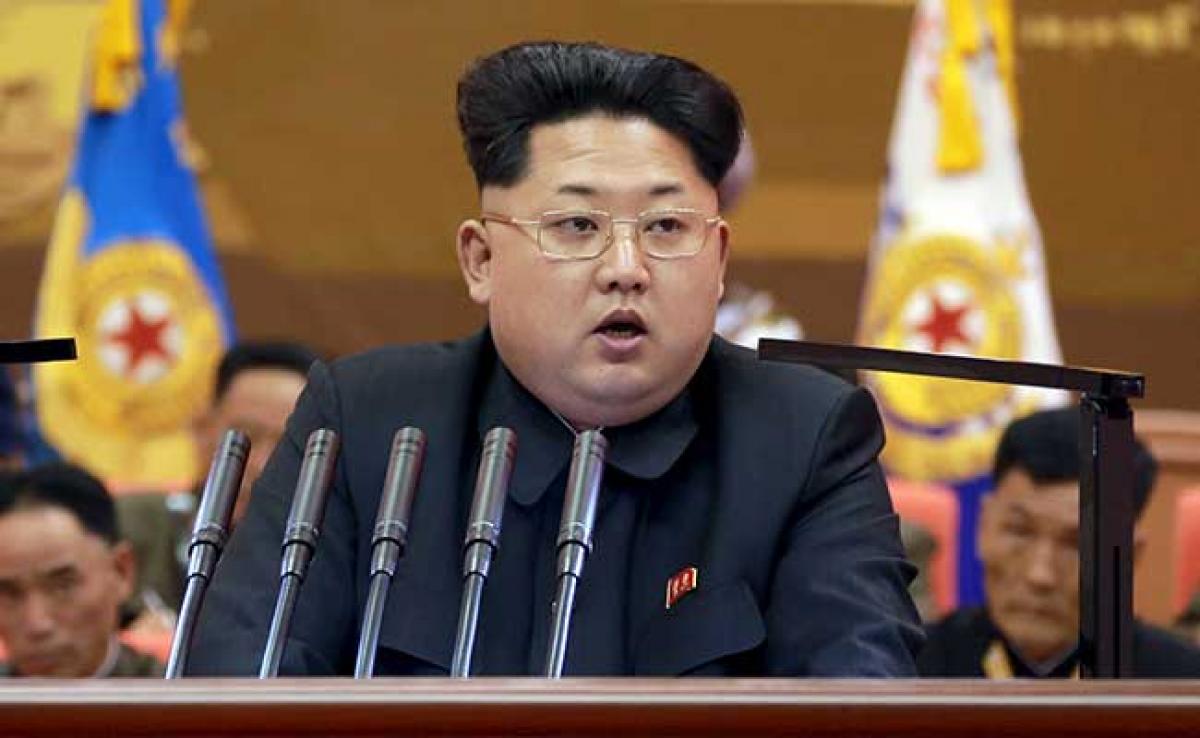Live
- First Impressions and Unboxing of the MacBook Pro M4: A Powerhouse for Professionals and Creators
- China Gears Up for Potential Trade War Amid Trump’s Tariff Threats
- Small Farmers Gain Less by Selling to Supermarkets: Study Reveals
- Why Despite the Controversy, America Is Anticipating the Mike Tyson vs. Jake Paul Fight
- Sanju Samson and Tilak Varma Shine: Record-Breaking Feats in 4th T20I Against South Africa
- India Urges $1.3 Trillion Annual Climate Support for Developing Nations
- Bad air: 106 shuttle buses, 60 extra Metro trips planned to make Delhiites give up cars
- WHO reports declining monkeypox cases in Congo
- CM Attends Kotideepotsavam on Kartika Purnima
- PKL Season 11: Raiding trio of Devank, Ayan, Sandeep help Patna Pirates rout Bengal Warriorz
Just In

x
Highlights
North Korean leader Kim Jong-Un said nuclear weapons -- not negotiating skills -- secured this week\'s \"landmark\" agreement with South Korea, as he dismissed a number of officials from a top military decision-making body.
North Korean leader Kim Jong-Un said nuclear weapons -- not negotiating skills -- secured this week's "landmark" agreement with South Korea, as he dismissed a number of officials from a top military decision-making body.
.jpg)
Chairing a meeting of the powerful Central Military Commission (CMC), Kim credited the North with striking the deal that ended a tense military standoff with the South, Pyongyang's official KCNA news agency said Friday.
The agreement, reached after marathon day-night talks in the border truce village of Panmunjom, pulled both sides back from the brink of an armed conflict and committed them to starting an official dialogue.
But Kim made it clear that sitting down to talks would not entail North Korea discussing the end of its nuclear weapons programme, which the young leader said was key to maintaining peace in the first place.
The Panmunjom agreement "was by no means something achieved on the negotiating table but thanks to the tremendous military muscle with the nuclear deterrent for self-defence", Kim reportedly told the meeting.
The CMC, which is the ruling party's top military policy-making body, handled the recent crisis, and the KCNA report suggested Kim may have ordered a mini purge afterwards.
Top officials dismissed
The meeting "dismissed some members of the Central Military Commission and appointed new ones and dealt with an organisational matter," it said, without elaborating on the reason for the dismissals.
Since taking power in North Korea following the death of his father, Kim Jong-Il, in December 2011, Kim Jong-Un has repeatedly reshuffled his senior military leaders.
The latest inter-Korean crisis had its roots in landmine blasts earlier this month that maimed two South Korean soldiers on patrol along the border with the North.
Seoul blamed Pyongyang and responded by switching on banks of giant speakers, which had lain silent for more than a decade, and blasting propaganda messages into North Korea.
The North denied any involvement and threatened to attack the propaganda units as cross-border military tensions soared.
The agreement reached in Panmunjom saw the North express regret -- but not admit responsibility -- for the maiming of the two soldiers, while the South ended the high-decibel broadcasts.
The talks were initiated by North Korea -- a fact that some analysts took as a sign that Pyongyang had blinked first in an escalating showdown that included a rare artillery exchange across the land border.
North's initiative
In his speech to the CMC, Kim acknowledged and embraced the fact Pyongyang had sought the negotiations as evidence of its moral and strategic strength.
North Korea's initiative, "put under control the situation which inched close to an armed conflict, thereby clearing the dark clouds of war," he said.
He underscored the need to channel "top priority efforts" into strengthening North Korea's military capability further.
While playing up Pyongyang's role, Kim stressed that the agreement was a "crucial landmark occasion" that offered both Koreas a chance to move forward to better ties.
South Korea meanwhile, flexed its military muscle on Friday, staging its largest-ever, live fire drill with the United States that included a simulated mechanised assault into North Korean territory.
Some 3,000 US and South Korean soldiers, around 100 tanks and armoured vehicles, 120 heavy guns, 45 helicopters and more than 40 jet fighters took part in the exercise -- 20 kilometres (12 miles) south of the demilitarised zone (DMZ), which splits the Korean peninsula between North and South.
Conducted in several stages, it envisaged an initial North Korean provocation, followed by an escalating clash, and culminating in a counter-attack across the border.
The show of force was broadcast live on television, with President Park Geun-Hye seen monitoring the drill with senior military officials.
The defence ministry's original scenario had role-played an attack on the South Korean propaganda loudspeakers, but it was revised after Tuesday's agreement.

Next Story
More Stories
ADVERTISEMENT
© 2024 Hyderabad Media House Limited/The Hans India. All rights reserved. Powered by hocalwire.com







